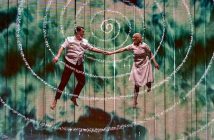Is it a book? Is it a film? Is it an opera? Actually, it’s all three. Marnie is the title of Winston Graham’s 1961 novel (yes, THAT Winston Graham, the one who wrote the Poldark novels), which was adapted into a film by Alfred Hitchcock in 1964. Now it’s enjoying a new lease of life as the third opera from American composer Nico Muhly.
The plot revolves around Marnie, a woman constantly on the run, from former lives, past crimes and, ultimately, the one thing she can’t outrun – herself. She slips from character to character, lying and stealing her way through life, largely to some truly beautiful music. The use of the ENO orchestra and chorus is sublime, in particular the chorus, with moments that rival anything in Britten’s Peter Grimes (which, for me, is high praise indeed). The chorus are more than up to the job, as are the ENO orchestra. There’s a depth of colour in the orchestrations that constantly offers the ear something new and exciting.

Muhly’s use of musical devices to add layers to what’s said (or unsaid) on stage is fascinating. Key characters are paired with a solo instrument, adding a kind of subtextual commentary to their lines. He also uses a quartet of ‘shadow Marnies’ (known as the Marnettes in rehearsal), who illuminate Marnie when she isn’t capable of doing so herself, which is most of the time. Muhly also largely manages the tough job of keeping the orchestra out of the way of his singers, although there were definitely times when it was impossible to hear what was being sung. ENO deals with this by sensibly having English surtitles to all its operas, even when (as here) they’re sung in English. Unfortunately, I was in one of the seats with no view of them, so had to do a bit of guessing and long distance lip reading at times.
The three leads – Sasha Cooke as Marnie and Daniel Okulitch and James Laing as brothers Mark and Terry – are superb. There’s also a fine cameo from Lesley Garrett, who, incidentally, manages to get every single word across. The staging is fluid and changeable, reflecting the central nature of Marnie herself. It works brilliantly and keeps the action moving at all times, which makes it even more of a shame that it’s a lack of dramatic momentum that ultimately lets the opera down.

Despite glorious music and equally fine singing, I was left clueless as to what was driving the central character, or, indeed, most of the characters. It seems I’m not alone. As an illuminating programme note from Paul Creno points out, ‘Marnie is disconnected from her deepest emotions and desires’ – even she isn’t sure what drives her. This brings us to the central problem with Marnie. Because we don’t fully understand the characters’ motivation, there’s a lack of real tension throughout. There should be terror, tragedy and, ultimately heartbreaking compassion, yet that feels a stretch too far. It’s not just about the odd bit of lost diction – although that didn’t help – it’s a fundamentally missing piece of the puzzle. That didn’t stop Marnie from getting a standing ovation from large sections of the audience on its premiere, which is a great sight to see for a modern opera.
Marnie runs at the London Coliseum until 3rd December 2017, before heading to the Met in New York next year. Production images by Richard Hubert Smith. For more information and tickets please visit the website.




